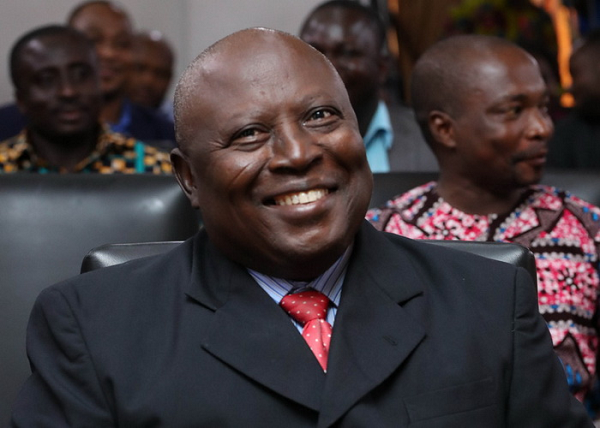Supreme Court okays Martin Amidu’s appointment as Special Prosecutor
Mr Martin A.B.K Amidu is eligible to be the Special Prosecutor, as his appointment did not contravene the 1992 Constitution, the Supreme Court has declared.

Mr Martin A.B.K Amidu is eligible to be the Special Prosecutor, as his appointment did not contravene the 1992 Constitution, the Supreme Court has declared.
In a 5-2 majority decision yesterday, the court, presided over by the Chief Justice, Justice Kwasi Anin Yeboah, dismissed a suit claiming that Mr Amidu was ineligible to be the Special Prosecutor because he was 66 at the time of his appointment and, therefore, his appointment was unconstitutional.
The suit was filed by Dr Dominic Akuritinga Ayine, a former Deputy Attorney-General and National Democratic Congress (NDC) Member of Parliament (MP) for Bolgatanga East.
Per the Supreme Court’s decision, the Office of the Special Prosecutor (OSP) is not caught by the retiring age of 60, as applicable in the public service.
The majority decision was by Justices Kwasi Anin Yeboah, Paul Baffoe-Bonnie, Samuel K. Marful-Sau, Nene Amegatcher and Professor Nii Ashie Kotey, while Justices Nasiru Sule Gbadegbe and Agnes Dordzie dissented.
The court did not give its reasons for dismissing the suit, but said the reasons would be filed at the court’s registry by the close of today.
In an interview with journalists after the judgment, Dr Ayine said he was extremely surprised that his case was dismissed.
He said although he was yet to see the reasons for the dismissal of the suit, he believed the decision would set a precedent, whereby people on retirement could be appointed into the public service.
“This will not give our young people the opportunity to serve in the public service of Ghana. I see this as a foreseeable consequence of the decision,” he said
Effect of the decision
The decision by the Supreme Court has cleared the way for Mr Amidu to continue prosecuting some alleged corruption-related cases he had initiated at the High Court which were put on hold pending the determination of his eligibility.
The cases include that of the MP for Bawku Central, Mr Mahama Ayariga, and six others who the Special Prosecutor accused of acting unlawfully in the purchase of an ambulance for Bawku Central.
The MP and the six others, including the current Municipal Chief Executive for Bawku, Hajia Ninchema, have been charged for allegedly engaging in procurement breaches.
In August last year, the High Court, presided over by Justice Afia Serwah Asare-Botwe, put the trial on hold pending the final determination of the suit challenging Mr Amidu’s eligibility at the Supreme Court.
Dr Ayine’s case
Mr Amidu was nominated by President Nana Addo Dankwa Akufo-Addo as Special Prosecutor on January 11, 2018 and was subsequently approved by Parliament.
Dr Ayine challenged the appointment by invoking the original jurisdiction of the Supreme Court to interpret the Constitution.
He argued that the whole process, including the nomination and approval of Mr Amidu as Special Prosecutor, was unconstitutional.
The suit was against the Attorney-General (A-G) and Mr Amidu, but on February 5, 2019, the court struck out the name of the Special Prosecutor as a defendant after it had held that he was not a proper party to the action.
It was the contention of Dr Ayine that upon a true and proper interpretation of articles 190 (1) (d), 199 (1), 199 (4) and 295 of the 1992 Constitution, the retiring age of all holders of public offices created pursuant to Article 190 (1) (d) was 60 years, which could be extended to 65 years.
He argued in his statement of case that by nominating and appointing Mr Amidu to be vetted and approved by Parliament, both the A-G and the President had violated Article 199 (1) of the 1992 Constitution.
“The Office of the Special Prosecutor was established by an Act of Parliament pursuant under Article 190 (1) (d) of the 1992 Constitution, which confers on Parliament the power to create such other public services as it may prescribe, in addition to the public services spelt out in Chapter 14 of the 1992 Constitution.
“The Office of the Special Prosecutor is, thus, a creature of the Constitution, to the extent that it is a direct offshoot of a power drawn from Article 190. Once Parliament passed Act 959 and the President assented to it on January 2, 2018, the Office of the Special Prosecutor became part of the public service and governed by the constitutional provisions relating to the public service and public office holders,” the statement of case noted.
A-G’s defence
In its defence , the state, represented by a Deputy A-G, Mr Godfred Yeboah Dame, urged the court to dismiss the suit.
He argued that the position of Special Prosecutor was a public office (organ) such as the Statute Law Revision Commissioner, not caught by the retiring age prescriptions in Article 199.
Also, it was his case that it would be unconstitutional to place a limit on a person exercising prosecutorial powers when the Constitution had made no such provision.
“It is submitted that to place the constraints of age on a person who exercises prosecutorial powers when the Constitution has not specifically provided for same is plainly untenable,” the Deputy A-G argued.
He further submitted that per Act 959, the law establishing the OSP, Parliament had provided the tenure of the Special Prosecutor as a seven-year non-renewable term.
Such a move, the Deputy A-G argued, was constitutional, per the combined effect of articles 88 (4) and 298 of the 1992 Constitution.


